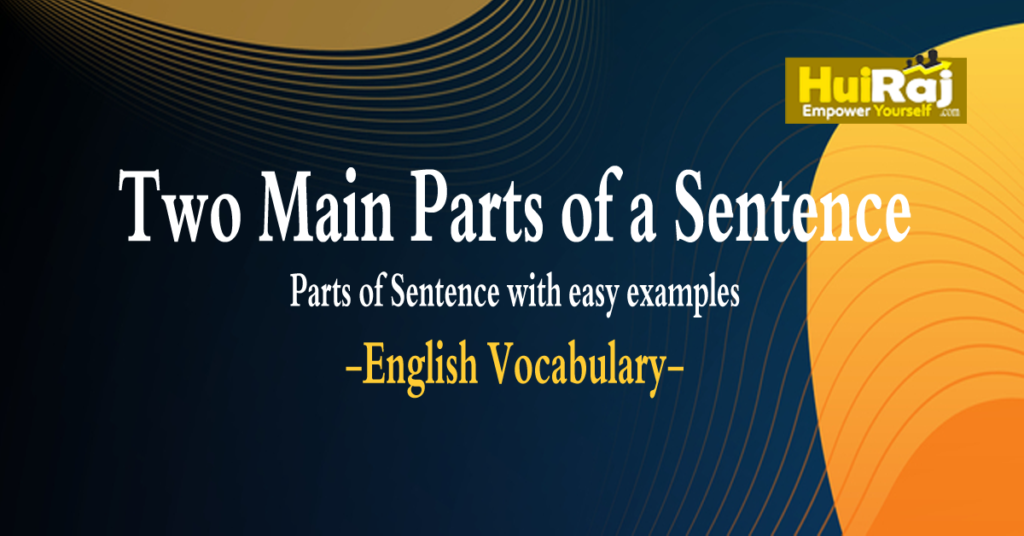Full Verbs and Auxiliary Verb, and Modal Verbs
You will read here details about Full Verb and Auxiliary Verb including Modal Verbs. As you have learned in Step-31 that every sentence consists of a Subject and a Predicate. The Full Verb, Auxiliary Verb, and Modal Verbs are all Predicating Verbs, but among these verbs, only one of them is Full Verb and the others are Auxiliaries Verbs or helping verbs. Let’s learn, what are Full Verb or Main Verb, Auxiliaries Verbs or Helping Verbs, and Modal Verbs?
The verb is the headword of the Predicate Part
Study the following sentences:
- Singers sing.
- The moon shines in the sky at night.
In sentence 1, the word ‘sing’ says something about ‘singer’. ‘Sing’ is the headword of the predicate part. Similarly, in sentence2, the word ‘shines’ says what the ‘stars’ do. ‘shines’ is the headword of the Predicate part.
As we know every sentence consists of a Subject and a Predicate. The verb is the headword of the predicate. ‘sing’ and ‘shines’ are verbs in the above sentences.
The Verb Group Sometimes consists of more than one word
Look at the pictures. Then read the sentences:



- Rocky can lift the barbell.
- Rajesh is reading a novel.
- The boys are playing cricket.
In the above sentences, the underlined words are the complete predicating verbs.“lift”, “reading’ and ‘playing’ are full verbs whereas “can” “is”, and “are” are auxiliary verbs.
Exercise-1 predicating verbs
Pick out the predicating verbs in the following sentences and circle them:
- The girl is eating a mango.
- The boy will dance this evening.
- Pavani has a beautiful pen.
- My wife is writing a novel.
- The stars are shining in the sky.
- The hunter shot a deer.
- Gopal has been studying hard.
- The school peon rings the bell.
- Youngsters should obey their elders.
- The man did the work.
- Ramesh will do his home task.
- Sachin Tendul Kar might play the match.
- Radhika will be doing the job.
- Owls cannot see in the daytime.
- Mice live in holes.
Mark the underlined and bolded letter verbs in the following sentences:
Auxiliary Verb | Full Verb, or Lexical Verb
- I write articles.
- He writes articles.
- She wrote articles.
- He is/was writing articles.
- He has /had written articles.
- She has /had been writing articles.
- He will write articles.
Sentences 1, 2, and 3 above have a one-word verb each in the verb phrase. The verbs (write, writes, and wrote) have not taken the help of any other verb(s).
In sentences (4), (5), (6), (7), we find that a group of words (such as is/was writing, has/had written, has/had been writing, and will write) function as the verb phrase.
The verb ‘write’ has a lexical or dictionary meaning. Such a verb is called Lexical Verb or Full Verb. Most of the verbs in English come under this class. The other verbs used in the examples are is/was, been in (4) and (6). They are different forms of the verb be. In the examples (6) and (7) ‘has’ and ‘had’ are the two other forms of the verb ‘have’. But, in example 7′ “Will” has a single form. These verbs are not used independently. They go with the appropriate form of the full verb in the verbal group. Besides, they have no lexical/dictionary meaning. Such verbs are called auxiliaries.
Now we come to know there are two types of verbs. Such as Full Verbs and Auxiliaries.
Exercise-2 for Auxiliary Verb | Full Verb, or Lexical Verb
Identify and underline the Full Verbs in the following sentences: Do not underline the Auxiliaries.
- Priyanka is drinking some water.
- She can speak English Fluently.
- A blind man cannot see.
- The poor boy began to weep.
- Jitendra will come to my house this evening.
- How many stories have you written?
- His axe fell into the water.
- It has been raining hard since Monday.
- The children fly kites every day.
- Let’s go for a movie.
ExercExercise-3 for Auxiliary Verb | Full Verb, or Lexical Verb
Identify and underline the Auxiliaries in the following sentences:
- The boys are playing cricket.
- Father has just come from the market.
- I am going to my Aunt’s house next Sunday.
- We shall leave the place at 6 o’clock.
- There will be a tea party in our office.
- Where will you spend the night tomorrow?
- The bus might be late today.
- She did not come to school yesterday.
- The girl could not run fast.
- You dare not oppose me.
- Raghav used to walk eight kilometers a day.
- The senior staff will visit Tajmahal during the Summer holidays.
Auxiliary Verb can be Full Verb
Look at the following sentences:
- She is a student.
- She is learning English Grammar at www.stepwiseenglish.com
In the first sentence “is “ is the predicating verb as well as the full verb. But in the second sentence “is” is an auxiliary verb and “reading” is a full verb. Both, in a combined way, work as the predicating verb.
Now study the following sentences:
- Rajesh is going home tomorrow.
- They have arrived early.
- (A) I do not know him. (B) Do you know him?
- I will go home tomorrow.
Which are the auxiliary verbs here?
In the above sentences (is, have, do, and will) are auxiliaries. In sentence (1) “is” (one form of ‘be’ ) is used along with the progressive form (go-ing) of the full verb.
See, in the sentence (2), the auxiliary ‘have’ is used with the past perfect (-en) form of the verb arrive.
In sentences (A) and (B) of (3), the auxiliary ‘do’ is used to form the negative and the interrogative sentences.
In sentence (4), the auxiliary ‘will” has a single form for all subjects. It cannot be used as a full verb. But, verbs like (be, do, and have) can sometimes be used as full verbs.
For example:
- She is a student.
- I did it last Sunday.
- He has a pet.
Types of Auxiliaries
Auxiliaries are of two types/kinds. They are Primary Auxiliaries and Modal Auxiliaries /Modals. (Be, do, and have) belong to Primary Auxiliary Group and (‘will’, shall, can, etc.) belong to Modal Auxilliary Group. See the chart given below.

Rules for using Auxiliaries and Modals
(A) two modal auxiliaries cannot go together in a verbal group but two primary auxiliaries can.
- I can
must - We have been living here since 1980. (Correct)
(B)The modal auxiliary cannot be immediately followed by a verb in the –ing form or the past participle form (-en form): We will call the past tense as the –ed form and the past participle as the-en form of a verb.
- I can
drivinga car. (Incorrect) - I can drive a car. (correct)
- He will
arrived/arrivessoon. (incorrect) - He will arrive soon. (Correct)
Exercise-4 for Primary Auxiliary and Modal Auxiliary
Find the Primary Auxiliaries and Modals Auxiliaries in the following sentences and Name them.
For Example:
(A) She may go. (B) He is going home tomorrow.
Answer: (A) may-Modal Auxiliary, (B) is-Primary Auxiliary
- The camel can carry a heavy load.
- The woman was sweeping the room with a broom.
- I would like a kilo of apples, please.
- Have you ever been to Kashmir?
- You should go to school in time.
- She used to sing better in her youth.
- We must do our duty.
- How dare you say so?
Learn More: Full verb or Main Verb and Auxiliaries or Helping verbs@Grammarly.com

